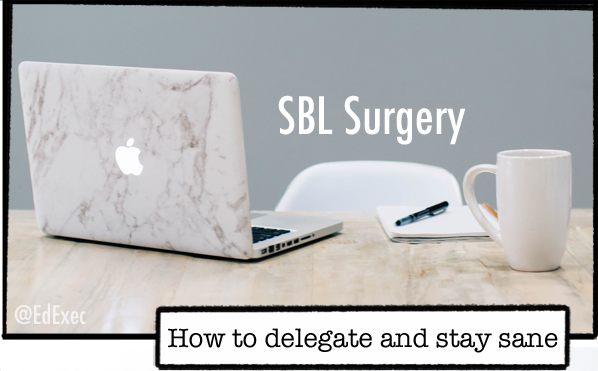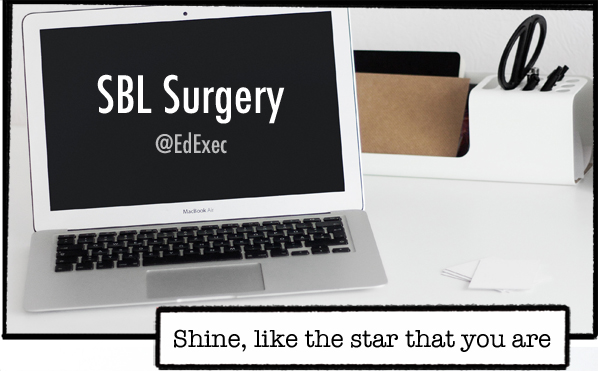When I was asked to write an article about CPD for School Business Leaders and how you can develop your skills my first thought was… seriously? Over the last year you have been developing your skills faster than Lewis Hamilton on a flying lap! (In under two minutes incase you don’t know how fast that is!)
SBLs have probably collectively been through the fastest rate of development and role evolution than ever before. We’re talking about health and safety, safeguarding, catering, ICT infrastructure, HR and financial management in the middle of a freaking pandemic! Unprecedented, unknown and uncertain times does not blooming cover it.
One thing is for sure though, you did not allow yourselves to be unseen. You rolled your sleeves up, donned your superhero capes and marched into battle.
It’s only now as the fog of war clears and you pop your cape into the machine on a ‘quick wash’, that the progress made and battles won can truly be appreciated.
And not only appreciated but understood.
I don’t have all the answers and there’s much to be discussed but in the context of developing yourself and your role, I am going to pitch up a starting point for the journey ahead. Let’s call it SBL Basecamp.
To understand where you’re going, you need to understand where you’ve been. It’s been a long and torturous road and though I know it might be painful, it’s time to get some perspective and reflect.
I want you to get a piece of paper and put ‘you’ in the centre. Then I want you to answer the following questions with you, your feelings, your opinions and your future in mind. I want you to write down your answers quickly and from the gut:
- What happened?
- What’s the impact?
- What’s changed?
- What’s better?
- What’s worse?
- What’s been learned?
- What does this mean for the future?
- What do I want?
These last two questions are the most important as ultimately, what the future might look like and what you want from it will determine the GPS coordinates for your journey beyond Basecamp.
If you don’t know what it is that you want, then keep writing on your piece of paper and focus on the following:
- What do I stand for?
- What are my values?
- What motivates me?
- What level of challenge and pressure am I comfortable with?
- What is my next logical step and is it one I’m ready and willing to take?
- Do I have more than one option and if so, when do I need to make a choice?
In terms of next steps, the development of your role may simply mean developing further within your current context. Progression doesn’t necessarily have to mean onwards (moving schools) or upwards (moving to a bigger or more specialist role). It may mean pulling up that long awaited seat at the SLT table or it may mean building the capacity of your team so in turn, you can build your own.
If progression does mean moving onwards and/or upwards to you, then there are yet even more questions to consider.
- Do you want move to another education phase?
- Do you want to be a generalist or a specialist?
- Do you want to work within a MAT or LA structure?
I know the questions I’ve asked you so far seem huge but until you start to hone your thinking in this way, it will be impossible to answer the next question.
How am I going to get where I want to go?
Yes, the simplest, most obvious answer is CPD but when it comes to determining what type of CPD then the path ahead becomes a lot murkier.
First of all, let’s break down CPD into more manageable chunks – or 3 strands:
- Strand 1… if you are experiencing difficulty or need to brush up/keep up
- Strand 2… if you need to acquire new skills or further enhance existing skills in your current role
- Strand 3… if you’re ready to acquire skills to prepare you for your next role
Now… with your piece of paper in front of you and your general GPS coordinates programmed in to Google Maps ask yourself the following:
- What am I looking to gain from CPD?
- What strands am I focusing on?
- Why am I focusing on them?
- Skills, knowledge, accreditation, credibility, meet compliance requirements?
- What is my learning style and preferred learning environment?
- Classroom, large group, small group, one to one, online, on the job, structured, flexible, formal, informal, quick, over time?
- What investment am I prepared to make?
- Budget, commitment to employer, time, workload, work/life balance, impact, value for money?
There isn’t a right or wrong way of learning and what works for one person will not work for everyone. And perhaps over the last 12 months your focus and preferences have changed! You just need to make the best, most informed decision for you.
There’s so much choice out there when it comes to CPD so here’s a quick CPD brainstorm to get you thinking!
- Qualifications
- Webinars
- Coaching
- Mentoring
- Regional & Local SBL Networks
- Join Professional Association and/or Union
- Social Media Networks
- Podcasts
- Online Courses
- Become a Governor
NB: I know that some of the more obvious CPD activities are missing from the list… Our options have been limited this past year in terms of face-to-face events such as conferences, training sessions, network meetings etc. (you won’t believe how excited I am to meet you all in person!) but as there is light at the end of tunnel, don’t overlook this type of CPD as part of your long term plan!
Remember, each of these suggestions will have different costs, time commitments, delivery methods and expected outcomes so do your research and before you part with your cash or sign on the dotted line… ask yourself this:
Am I selecting the right type of CPD to help me achieve my goals?
If the answer is ‘no’ or ‘not quite sure’ then put your pen down, put your piece of paper away and come back to it in a week. Or maybe you just want to hang out at Basecamp a little while longer to gather your thoughts!
It might not even be until the summer break that you can finally take a full breath and look around.
That’s totally fine.
You don’t have to have it all figured out.
Just remember that whenever it is that you’re ready to venture out of Basecamp, you’re not alone. I’m here, the SBL community is here and we’ve got your back. Now go peg that cape out to dry and I’ll see you soon!
To complete a short survey about SBL CPD just click here! This survey is totally anonymous (unless you choose otherwise) and your feedback will help me focus on developing and creating more ways to help you to reach your goals and get to where you most want to be.
Like what you’ve read? Subscribe to this blog by clicking here.
P.S. Have you joined The Business of School Leadership Facebook Group yet? For practical support, advice, tips, tools & guidance about all things school leadership, join us in the community by clicking here.
Written for: Edexec – Education Executive Magazine (@edexec)










